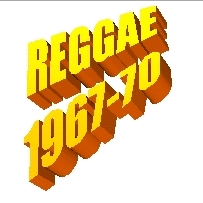

After Ska, and during the Rock Steady era the major producers Coxsone, Duke Reid, and Prince Buster, continued to dominate the music business in Jamaica.
By now, though, that business was about ten years old, it was coming up to around early seventies and there were enough people in it who could see that it didn't take special skills to be a producer' and that there seemed to be some money In being a producer.
These two reasons alone were enough to cause major, or changes in the business, but link this to the love of musical innovation, and you have all that is needed for a musical revolution that is part of the process of the evolution of Jamaican music.How can revolution be evolutionary? Well everyone involved in the creation of the reggae sound that was to emerge in 1967 all had experience of the business, some back to it very creation. They knew what the people wanted, and they knew it wasn't Rock Steady. The main reason it was disliked was its slowness. By and large the people at the dances wanted something a little hit faster.
Now usually the major Producers would be the first to notice this (they all had sound systems) but by now they were no longer running them. Of course, they owned them, they made the money, but they didn't have the direct contact that they had in the past. They were slow to respond to the new sound, and they paid for it was left was left to the new wave of producers to rise to the challenge of the reggae sound. They included Derrick Harriott, Harry J, Sir JJ, Sonia Pottinger, Harry Mudie, Alvin Ranglin, Byron Smith, Joe Gibbs, Winston Riley, plus many more.
All of them were more or less trying to achieve the same status of th e new innovators the big three, Leslie Kong, Lee Perry, and Clancy Eccles, who had the pushed likes of Coxson Dodd, Duke Reid and Prince Buster aside.
Out of the three, the biggest was Leslie Kong and his Beverley's label, which started In the early sixties. It seems that Jimmy Cliff was looking for someone to record him and approached Leslie Kong who was part of a family business, owning a local store, with the idea for him to enter the record business.
It wasn't long before he had a roster of artists that included Jimmy Cliff, Desmond Dekker, and Derrick Morgan all of whom he had a great deal of success with. DurIng the Rock Steady era, he signed the Maytals to the label, and it was: them along with Desmond Dekker who really set the label up for the major success that came during the Reggae era. The Reggae era started around I967, and all that really can be said Is that the sound of reggae quickly became the Beverleys sound. It was a clean sound driven along by the Beverleys All Stars, characterised by a bouncing bass line, picking guitar, and rim shot drumming, and no horns.
Leslie Kong's main artistic rival was Lee Perry, Scratch The Upsetter. Scratch had started out as part of the Coxsone's sound system crew. He was quickly employed in the running of the studio, while also recording for the Studio One label.
When Joe Gibbs started his label during the Rock Steady era, he turned to Lee Perry for help during recording sessions. It wasn' t long before Scratch was more or less producing for Joe Gibbs, and it wasn' t long after that, that they had a disagreement. Scratch started the Upsetter label and one of it's first releases was 'People Funny Boy'. This type of reggae was raw and wild. Although it had the same elements that could be found in the Beverleys productions the mix was radically different. Who the Upsetters were then is one for research. During the reggae era no one artist was really concentrated upon. Instead, Scratch worked with artists like David Isaacs, Dave Barker, and vocal groups like The Untouchables and The Bleechers. His greatest success probably was with King Stitt, with whom he had a number of early DJ hits includIng classics like 'Fire Corner' and 'Herbsman' . Other big hIts included The Fabulous Flames' 'Holly Holy', and his own massive hit 'Fatty Fatty'. Another classic from that time is Lord Creator's 'Kingston Town'. By the time of the reggae era, Clancy Eccles had been in the business in one form or another for the best part of 12 years. In the late 1950's he started to work with
Coxsone Dodd recording a number of tunes, two of which hit really big 'Freedom' and 'River Jordan'. In the mid sixties he turned producer and set up the Clan Disc label.
His first production was with Monty Morris 'Say What Your Saying', which was a hit. He followed it with many many more during the reggae era. The reggae era belong then to these producers, and men and woman (not forgetting Sonia Pottinger) like them. Yes Coxsone Dodd, Duke Reid and Prince Buster all contributed to this era, but they weren't directing it in the same way that they did the Ska and Rock Steady. The new ideas, the best ideas were coming from this group of new producers So who were these new producers making the hits with, who were the stars of the reggae era? Well for starters, The Maytals were, Consisting of Toots Hibbert, Jerry McCarthy and Raleigh Gordon.
They cut their first records for Coxsone moved over to Prince Buster and then did some work with Byron Lee at Wirl.
The music they made with these three producers turned them into stars of the Ska era. They probably would have had the same effect on the Rock Steady era, but Toots was imprisoned for smoking herb.
When he came out of prison, the group immediately started to record with Leslie Kong's Beverley's label. One of the first records they made for the label was '54-46'. This was towards the end of the rock steady era, it was a major hit for the group.
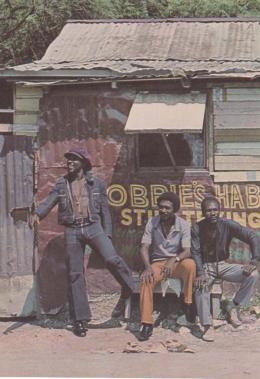
Then came the reggae era, it's possible that they even started the Reggae era off, with their tune 'Do The Reggay' , not that it matters, because from 1967 right through to 1970 they ruled the music with their wild gospel sound. Any of the Maytals albums released at the time will provide the explanations of how they did it.
The groups relaxed soulful sound was very popular, and provided a nice balance between the gospel/roots sound of the Maytals, and the roots sound of The PIoneers. Unlike the latter groups, The Melodians sound was not collected together on an album, so much of their work became very hard to get hold of. Finally thIs major injustice was corrected by Island Records in l980, with the release of 'Sweet Sensation' containing 8 classic tracks, from the reggae/roots era' s.
Most vocal groups from Jamaica tend to be very soul influenced. One group The Pioneers (Sidney Crooks. George Dekker, and Jackie Robinson) brought in a new harmony tradition to the music, that had its roots both in the rural/country and the ghetto.
They started off in 1962, then the group was made up of Sidney Crooks, Glen Adams and Derrick Crooks (Sidney's brother). By the time they started to record for Joe Gibbs, (1966) Jackie and George had been brought in. With Gibbs they had a really big hit with 'Catch The Beat' and went on to record an album for the producer.
Yet the success that they had enjoyed with Joe Gibbs, was nothing to what was to come when they joined the Beverley's label in 1968. The first couple of tunes for Beverley's and producer Leslie Kong were not that successful, then they recorded 'Long Shot Kick The Bucket'.
This tune was a tremendous success in Jamaica, and in the UK it took them into the pop charts. The following year '69 they had another big hit with 'Samfie Man', this one didn't do as well in the UK, but by then the group was well established in the UK, doing very well with the two albums both produced by Leslie Kong, 'Long Shot Kick The Bucket' and 'Battle Of The Giants'.
It would seem that Leslie Kong had the vocal group market, during the reggae era, more or less under his control. It might seem like that, but in reality, the situation was much more complex.
All of the producers had at least one vocal group on their label. They all had the potential to be a Maytals or a Pioneers or a Heptones, the big problem was keeping them together long enough for them to become successful.
Bunny Lee solved this problem in a very 'Unique' way. Instead of a vocal group, he formed a vocal team. Their name was the Uniques. From the time that they were created. the line up was in a constant state of change.
Once again, this was nothing new, most vocal groups so change personnel very quickly, in doing so they usually lose their sound. Bunny turned this problem into the solution of the problem. During the reggae era, the Uniques included,Jimmy Riley, Lloyd Charmers,Roy Shirley and most important of all Slim Smith, who was the sound of the Uniques. His voice was so strong, that in the end it was natural for him to go solo. 'Absolutely' the groups debut album find them in the rock steady and reggae eras, and is a classic set.
The Ethiopians, (Leonard Dillion and Stephen Taylor) like all the other vocal groups of the Reggae era. gained their first successes during the Rock Steady era. 'Train To Skaville' and 'The Whip' were both massive hits.
Around l969 thev started to record for producer Carl Johnson's Sir JJ label. Over the next couple of years, the group, with Carl Johnson at the controls, became one of the top vocal groups of the era.
Their first big hit for Sir JJ was 'Everything Crash'. It was a reality song that described the problems of a small ,newly independent country which Jamaica then was. It was also very typical of the insight brought to such problems by Leonard Dillon.
The Ethiopians, like The Wailing Souls and Justin Hines and The Dominoes, were very fond of using proverbs and old time Jamaican savings to illustrate their songs. This technique, used with restraint and skill, alwavs gave their music an edge. Other hits followed including 'Hong Kong Flu', 'What A Fire' and 'Woman Capture Man' . These tunes raise the popularity of the group to up to such an extent that they toured the UK in l969. For the tour and on certain recordings for Sir JJ, they were joined by Meivin Reed.
Trojan Records released two albums at the time by The Fthiopians both proiuced by Sir JJ, 'Reggae Power' and 'Woman Capture Man' . More recently the company issued a various producers set by the group called 'The Original Reggae Hitsound'.
Another group outside of the Beverleys powerbase of The Maytals, The Pioneers and The Melodians, was the The Kingstonians lead by Jackie Bernard. They also worked with Carl Johnson's Sir JJ label, but their success during the reggae era came with singer / songwriter/producer Derrick Harriott.
Although in sound their style was very roots, lyrically they were very close to The Pioneers. They used old time sayings and proverbs but never got too culturall or Sang too many reality tunes Their success came from their overall vocal harmony more than anything else. Having said that, one of their biggeest hits was 'Sufferer' , a reality tune. More tynical of the group's material were their other bigs hits for Derrick Harriott. These were 'Singerman' and 'Winey Winey' 'Singer Man' sounds like it's got the Hippy Boys on it, big wide bass lines long organ breaks. ' Winey Winey' is also mememorable, with its very distinct bass line. All the tunes mentioned are available on the groups album 'Sufferer' released on Trojan at the time, and recently re-released by the same company.
Without Jimmy Cliff, Beverley's might not have existed. Without Beverley's and its owner Leslie Kong, the reggae era would have been totally different. And without all the international success that came to the music during that era, the whole future of the music would have been different.
Reggae music owes a lot to Jimmy Cliff, not that it would ever acknowledge it. For Jimmy and reggae music have had a wild sort of relationship over the years.
His most creative work however was done during the 'Reggae' era l967 to 1970, most of it co-produced with Leslie Kong.
Until recently it would have been very difficult to find an album that gathers up all the various tracks that Jimmy had released during this time. Some were released on Trojan, others on Island, some on album only. Now witk the 'Reggae Greats' album on Island, simply called 'Jimmy Cliff', it's possible to enjoy all that made Jimmy Cliff truly great.
'Vietnam' and 'Hard Road To Travel' are well known hits. 'Sufferin' In The Land' was a big- reggae hit. 'Let Your Yeah Be Yeah' and 'You Can Get If You Really Want' were hits for the Pioneers and Desmond Dekker respectively, but here are the originals. Other great tracks are 'Struggling Man and 'Sooner Or Later', roots music, before the term was ever thought of.
Like Jimmy Cliff, Desmond Dekker had strong Leslie Kong Beverleys connections goind back into the ska era Also like Jimmy, he stayed with Leslie Kong. Until the producer died in 1971.. A major difference though was how the reggae audience viewed the artists. Jimmy looked like he was becoming a star during the reggae Desmond Dekker was a star.
In many respects, it was this perception of him, that he couldn't get any bigger, that held him back. '007', 'Israelites' and 'You Can Get It If You Really Want' should have been the beginning for him. These were massive international hits-, instead they ended up holding him back in some strange way, forever entrapped in the reggae era.
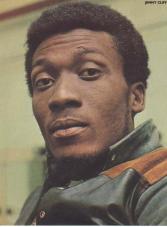
Yet these these songs, and others like' It Mek', 'Live And Learn' and 'Pickney Gal' should have been the foundations for something a whole lot better than what Desmond has got now Part of his problem, then and now, is that his best work has never been available on one album, at any time. His last compilation album, released by Trojan, 'The Original Reggae Hitsound' issued in 1985 really needed to be a double. As it is,it' s too varied to make any sense.
The massive success of the Reggae sound in the UK, was that was needed for those reggae arstists based in the UK, to start producing the sound in the UK.
One of the most successful producers/singer was Dandy or Dandy Livingstone. Dandy has started producing in this country during the Ska era for the Carnival label. He had a big hit for the Ska Beat label with 'Rudy A Message To You' in 1967, followed by an album 'Rock Steady With Dandy'.
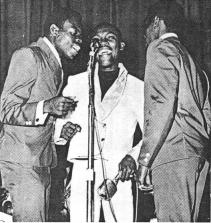
When he joined Lee Gopthal's Trojan label in 1968, he quickly adapted to the new reggae beat. 'Reggae In Your Jeggae' 'I'm Your Puppet' and 'Raining In My Heart' were all major hits for him.
At the time he seemed to be the only artists in the UK, who could get a really good 'Rootsy' sound. 'Raining In My Heart' being the best example. Most of this work was done at Chalk Farm Studios, with bands like Greyhound and The Cimarons. He also produced other singers, Tony Tribe's very successful 'Red Red Wine' being one example.
His best album from the reggae era was 'Your Musical Doctor' which actually was released on the Down Town label. On it were tunes like 'Everybody Loves A Winner'
'Come On Home' and 'Here I Go Again' As always, the sound he got on the album was excellent, It was UK reggae at its very best.
Another development was the growing number of Jamaica based reggae artists coming over on tour, and then recording with either the Trojan or Pama labels. Initially, Pama was more into this than Trojan.
During the late sixties, they released UK produced music by Derrick Morgan. Whose releases from the Jamaican R&B era right into the mid-seventies run into hundreds of tunes.
Recently Reggae Retro in the UK released a fantastic compilation of Derrick Morgan's reggae output called 'Original Reggae Recordings From 1968-70'. Featuring 23 tracks including 'Seven Letters', Fat Man' and 'Moon Hop' three of the man's biggest hits from this era. Pat Kelly, Max Romeo and Alton Ellis. They also released music from long-time residents Laurel Aitken. For many years virtually nothing of Laurel catalogue of music from the late fifties was available. Once again thanks to Reggae Retro, this as changed. His reggae era album is called 'Woppi King' and draws on a wide variety of themes for inspiration. 'Jesse James' and 'Landlords Tenants' are probably the two biggest hits, but the entire selection is truly essential. Owen Gray is another major singer from this era, although nothing this era is yet available.
Max Romeo became involved in this process, after his Bunny Lee produced 'Wet Dream' went into the pop charts. His 'A Dream' album recorded with the Rudees band had arrangement production credits to Ronnie Williams and Derrick Morgan, with production going to H.Dee/B.Lee/ D.Morgan.
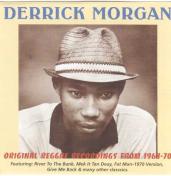
Overall the sound was bit rougher than Dandy's, and they lyrics were a mix of slackness and love songs. It could have been a better album, but it was still a popular album. One of the best tracks was ' You Can't Stop Me', Max had originally recorded this when he was a member of the Emotions, during the rock stready era.
The reggae style now had more than one sound, both in Jamaica and the UK. Soon a new argument could be heard amongst reggae fans. Could reggae be produced in the UK? Like a lot of other things, it depended on who was doing the producing.
Every era of the music seems to have a small set of artists and artists and producers, who never get any credit at the time, but whose contribution is always highly thought of many years later.
The main reason this seems to happen so much in the music, is the way the music is promoted. If an artist is with a hot producer he can be very successful, even though he may be out of form himself. Strangely the same thing is not true in reverse. An artist in form working with a producer out of form or favour will usually get ignored.
This is the case with Delano Stewart and Johnny Osbourne. If they had recorded their respective albums with any of the big producers of the reggae era, they would be thought of entirely differently today. Instead Delano Stewart recorded his 'Stay A Little Bit Longer' album for Sonia Pottinger and Johnny Osbourne recorded his album 'Come Back Darling' for Winston Riley.
Delano Stewart's album is a classic without a doubt. It could even be the best solo vocal album of that era. (Released at the time.) Most of the songs are originals and the production throughout the album is crisp.
Mrs Pottinger had a preference for The Hippy Boys then, even recording an instrumental album with them. So there's a very good chance that is it The Hippy Boys on the rhythm tracks on this album.
The title track 'Stay A Little Bit Longer' was a hit, but the best track on the album is 'That's Life'. Over the years, it had been recut many times, but this original is the best. Another favourite is 'Don't Believe In Him' which is usually recut under another title.
Johnny Osbourne's album or to be more precise, Johnny Osbourne and the Sensations album 'Come Back Darling' is very underrated. Although in respects, that is more understandable. Of the ten tracks on the album, four are organ instrumentals, by that noted organ player Johnny Organ! Winston Riley probably wanted ten tracks for the album, but with Johnny flying off to live in Canada on the same day he was recording the album, he had little chance of getting another four tracks from him easily, hence the organ instrumentals.
The remaining six tracks contain some true classic though, tunes like 'Come Back Darling' 'Warrior' and 'See And Blind' are Johnny Osbourne at his very best. These have been recut by the man many times over the years. Production wise, Winston leans towards the rough and ready style favoured by Lee Perry.
Two of the greatest voices of the Reggae era were Slim Smith and Nicky Thomas. That their deaths went largely unnoticed really tells you a great deal about the way the music has been reported over they years.
Slim Smith came forward during the late ska/early rock steady eras. He made music for Coxsone and Prince Buster, before joining up with Bunny Lee, with whom he recorded for extensively as a solo artist, and as a member of the Uniques.
His relaxed, high-ranged vocal style made easy work of the material that Bunny preferred him to sing. And yet the formula was very successful. It was good to hear classic songs sung over upful reggae rhythms, in the way that Slim sung them.
Every now again though, Slim would get the chance to sing an original, and these included 'The Time Has Come', 'My Conversation' 'The Beatitude' and 'Don't Tell Your Mama'. These tunes were recorded for Bunny Lee, and were all hits during the time of Rock Steady/Reggae.
Other classics were recorded for Coxsone, and include the magnificent 'Never Let Go' and 'Rougher Yet'. His best work can be found over a selection of albums that Bunny Lee has released over the years: 'Everybody Needs Love', 'Just A Dream' and 'Golden Collection' being the most recent titles, while the Studio One album 'Born To Love', is also essential listening.
At the other end of the vocal range was Nicky Thomas. Nicky started out in the early sixties, but it wasn't until 1968 when he made his first record for singer/producer Derrick Harriott - 'Run Mr Nigel Run' that he got a small hit, this gave Nicky a nickname 'Mr Nigel'.
In the same year. Nicky moved over to producer Joe Gibbs. His first tune for him was 'Love Of The Common People'. In Jamaica it sold very slowly, but in England it was a different story. It turned into a pop hit selling around 175, 000 copies. Joe Gibbs quickly got to work on Nicky's debut album 'Love Of The Common People'. This album contained most of Nicky's best work including the follow up to 'Love' 'God Bless The Children' which also went into the pop charts.
These tunes were overdubbed with strings for UK release, and are some of the best examples of this very negative practice. Nicky's voice didn't really need no more than than the solid rhythms of Joe Gibbs for support. To prove this check out 'Lonely Feelin' and 'Have A Little Faith'. Reggae music at it very soulful best. Sadly for whatever reason 'Love Of The Common People' is not available at the moment, although Trojan have released a set called 'Moonwalk'.
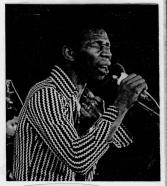
Every era of the music always starts with a change of the beat or rhythm. Musicians provide this change, and yet they never seem to get any credit. Their story always is the first to get lost. What's left usually amounts to very little. A vague recollection of so and so being in the studio when this was cut, and so on. Sadly this is the case with the reggae era. One band however did play a major role in shaping the sound of that era, and they were the Beverley's All Stars. When they worked for different producers they would be given a different name, but was the same band. Which was made up of the following personnel:
Jackie Jackson - bass, Winston Grennan - drums, Rad Bryan - rhythm Guitar, Hux Brown - lead guitar, Winston Wright - organ, Gladstone Anderson - piano. That was it, that was the reggae sound. Bass, Drums, Rhythm Guitar, Lead Guitar, Organ and Piano. Sometimes you would get percussion and horns featured, usually not.
The alternative band, was the band known initially as The Hippy Boys, and then The Upsetters. They were made up of: Aston 'Family Man' Barrett - bass, Carlton Barrett - drums. Alva Lewis - lead/rhythm guitar, Glen Adams - organ.
As mentioned elsewhere the Hippy Boys were popular with Sonia Pottinger as well. Another less well connection was Lloyd Charmers. His work with the band needed to be collected together and once again a great job as been done by Reggae Retro who have released 'Psychedelic Reggae' a well hard selection of instrumentals from the band. The 22 tracks include 'Cat Nip', 'Dr No Go' and 'Safari' three very popular tunes from the band.
Into these two groups of musicians were a number of musicians, who would fill in when those named above were on tour, or unavailable.
They would include keyboard players like Ansel Collins, Earl 'Wire' Lindo, and Neville Hinds. Bass players would include Boris Gardiner, "and the tall chap who everybody called 'Bassie'." Guitarists Bobby Aitken and Lyn Taitt also could be found on sessions during the era. If there were any other drummers of this era, they must all have been working for Studio One or Treasure Isle, because there is no mention of them anywhere.
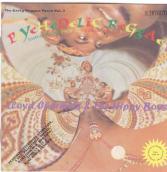
Dynamics and Federal, and later Randy's were the main studios for all the independent producers, these musicians in whatever combination, took the speed of Ska and the electric bass of Rock Steady and came up with a sound that conquered the world.
What they created put Jamaica firmly on the musical map once and for all. The term reggae now covers a multitude of styles. Yet the real thing is a mix of the following. Drums played on the rim, rim shot drumming.Very simple bass lines, The Maytals - '54-46' being the best example of this. Organ wrok was confined to a simple riff. Bubbling lead guitar. While the most important component, the rhythm guitar, Played two strokes to th beat, instead of the one found in Rock Steady. Ten years later Sly Dunbar played the same thing on the drums and called it 'Bouncers'.
In the Ska eras. DJ's were confined to introductions and a bit of shouting. In Rock Steady, the talkers arrived, by the late sixties, it was time for the combination of shouting and talking, with a certain amount of style.
Without doubt the most stylish of them all was King Stitt, also known as the Ugly One. He had been working for Coxsone for years on his sound system (number one set). Coxsone should have been very well placed to bring him forward, but for some reason best known to Coxsone, he didn't.
To be accurate here, Coxsone did release one or two King Stitt records, but it seems they were in response to the productions of Clancy Eccles, rather then something he seemed interested in doing.
Clancy's works with King Stitt, were magnificent. They seemed to capture the raw energy of the reggae sound very well. It was a shame that Clancy never released an album at the time of all his productions with him. For when he did compile a set for the Jamaican Gold label 'Reggae Fire Beat' it was excellent. A truly essential work.
Dave Barker made a great album for Lee Perry 'Prisoner Of Love' where you can hear him singing, and the other one was with Ansel Collins. Dave And Ansel Collins had two pop charts records 'Double Barrell' and 'Monkey Spanner'. 'Double Barrel' was a number one in the British pop charts. Both tunes were produced by Winston Riley.
They were both in Dave's 'Yankee' James Brown style which was originally heard on Lee Perry's upsetter tunes like 'Shocks Of Mighty' and 'Upsetting Station'. The tunes for Winston Riley were massive hits before they even reached the pop charts. Even then people enjoyed hearing an American style voice a Reggae rhythm. Rapping goes back a lot further than most people would like to think, just like deejaying.
Reggae
Selected Album Discography.
Leslie Kong - Best Beverleys - Trojan
Leslie Kong - King Kong - Island
Lee Perry - Return Of Django - Trojan
Lee Perry - Clint Eastwood - Pama
Clancy Eccles - Jamaica Reggae - Clandisc
Clancy Eccles - Fatty Fatty - Trojan
The Maytals - Monkey Man - Trojan
The Maytals - From The Roots - Trojan
The Melodians - Sweet Sensation - Island
The Uniques - Absolutely - Trojan
The Pioneers - Longshot - Trojan
The Pioneers - Battle Of The Giants - Trojan
The Ethiopians - Reggae Power - Trojan
The Ethiopians - Woman Capture Man - Trojan
The Kingstonians - Sufferer - Trojan
Laurel Aitken - Woppi King - Trybute
Jimmy Cliff - Reggae Greats - Island
Desmond Dekker - You Can Get If You Really Want - Trojan
Dandy - Your Musical Doctor - Trojan
Derrick Morgan - Original Reggae Recordings 1968-70 - Trybute
Max Romeo - Wet Dream - Pama
Delano Stewart - Stay A Little Bit Longer - Trojan
Johnny Osbourne & The Sensations - Come Back Darling - Trojan
Nicky Thomas - Love Of The Common People - Trojan
Slim Smith - The Time Has Come - Pama
Dave & Ansel Collins - Double Barrell - Trojan
The Hippy Boys - Reggae - Trojan
Lloyd Charmers & The Hippy Boys - Psychedelic Reggae - Trybute
King Stitt - Reggae Fire Beat - Jamaican Gold
Various Artists - Tighten Up - Trojan
Various Artists - Tighten Up Volume 2 - Trojan
Various Artists - Tighten Up Volume 3 - Trojan
Various Artists - Club Reggae - Trojan
Various Artists - Club Reggae Volume 2 - Trojan
Various Artists - Club Reggae Volume 3 - Trojan
Various Artists - Reggae Chartbusters - Trojan
Various Artists - Reggae Chartbusters Volume 2 - Trojan
Archived with permission from the Small Axe Reggae News Website Feb. 2000